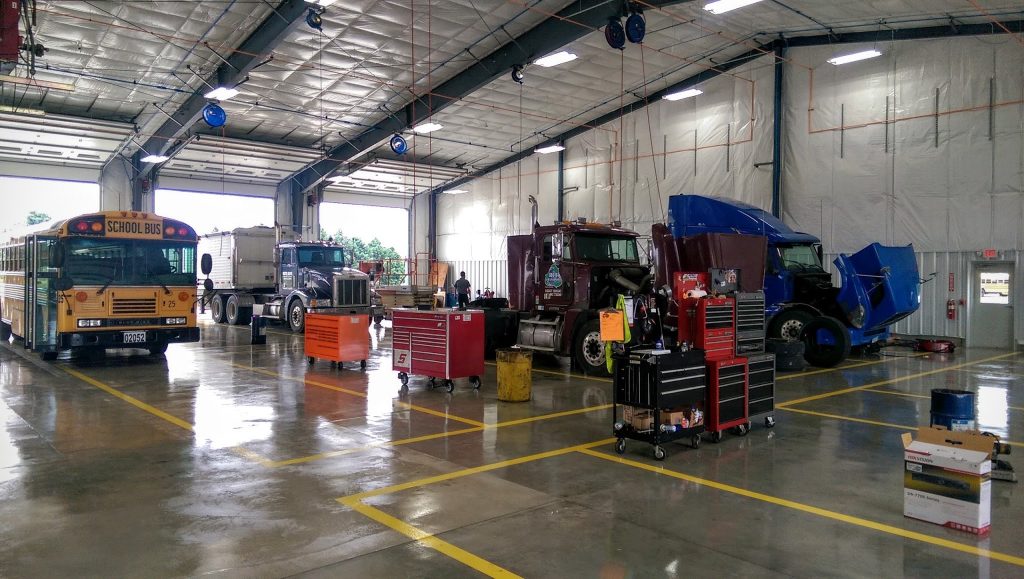Saving money with do-it-yourself (DIY) truck repairs is a cost-effective approach that empowers individuals to tackle maintenance and fixes on their own. Engaging in DIY truck repair not only helps cut down on labor expenses but also fosters a sense of self-reliance and skill development. By taking the initiative to handle routine maintenance tasks and minor repairs independently, individuals can enhance their understanding of their trucks, troubleshoot issues promptly, and ultimately reduce the overall financial burden associated with professional services. Embracing a DIY mindset in truck repair not only saves money but also promotes a hands-on connection with your vehicle, making the maintenance process both economical and rewarding.

Embarking on do-it-yourself (DIY) truck repairs necessitates a toolkit that can handle a range of tasks. Here’s a list of essential tools to have on hand for effective and efficient DIY truck maintenance:
- Wrench Set: A comprehensive set of wrenches, including both open-end and socket wrenches, is vital for various bolt and nut sizes.
- Screwdriver Set: Ensure you have both flathead and Phillips-head screwdrivers to tackle a variety of fasteners.
- Pliers: A versatile tool for gripping, bending, and cutting, pliers come in handy for multiple applications.
- Jack and Jack Stands: These are crucial for lifting and securing the truck, providing a safe working environment.
- Socket Set: A socket set with various sizes is essential for removing and tightening nuts and bolts.
- Oil Filter Wrench: Specifically designed for removing and installing oil filters during oil changes.
- Oil Drain Pan: To catch and dispose of used oil during oil changes.
- Funnel: Facilitates the clean and precise pouring of fluids, such as oil and coolant.
- Torque Wrench: Essential for achieving accurate torque when tightening bolts to specific specifications.
- Brake Bleeder Kit: Useful for bleeding the brake system and maintaining proper brake fluid levels.
- Battery Charger or Jump Starter: Ensures your vehicle’s battery is charged, preventing starting issues.
- Tire Pressure Gauge: Regularly check and maintain proper tire pressure for safety and fuel efficiency.
- Multimeter: A versatile tool for checking electrical systems, including fuses and wiring.
- Lug Wrench and Tire Iron: Essential for changing flat tires.
- Work Gloves and Safety Glasses: Protect your hands and eyes during repairs.
- Creeper: Makes it more comfortable to slide under the truck when working underneath.
- Diagnostic Code Reader: Helps identify issues by reading the truck’s onboard diagnostics system.
- Haynes or Chilton Repair Manual: Specific to your truck’s make and model, providing valuable guidance on repairs and maintenance.
By having these tools at your disposal, you’ll be well-equipped to handle a variety of DIY truck repairs and routine maintenance tasks, saving both time and money in the process.
Engaging in do-it-yourself (DIY) truck repairs is a practical and cost-effective approach for various levels of damage, but it’s crucial to assess the complexity and safety implications of the repair task. Generally, DIY repairs are well-suited for the following levels of truck damage:
- Routine Maintenance: DIY is ideal for routine maintenance tasks such as oil changes, air filter replacements, and fluid top-ups. These activities are relatively simple and don’t require advanced technical skills.
- Minor Repairs: Small-scale repairs, such as replacing spark plugs, light bulbs, or worn-out belts, are often well within the capabilities of a DIY enthusiast. These tasks typically involve straightforward procedures that can be accomplished with basic tools.
- Brake System Maintenance: DIY repairs for brake pads and rotors replacement, as well as brake fluid bleeding, are common and feasible for individuals with a moderate level of mechanical aptitude. However, extensive brake system overhauls may require professional expertise.
- Battery Replacement: Swapping out a truck battery is a straightforward task that many DIYers can handle safely. Just ensure proper disposal of the old battery in accordance with environmental regulations.
- Tire Changes and Repairs: Changing a flat tire or repairing minor punctures is well within the DIY realm. This includes tasks like tire rotation and maintaining proper tire pressure.
- Exhaust System Repairs: Patching small holes or replacing a section of the exhaust system can be tackled by DIYers, though extensive exhaust system issues might require professional attention.
- Electrical System Issues: DIYers can troubleshoot and replace fuses, bulbs, and some electrical components. However, complex electrical problems may need professional diagnostics.
It’s important to note that while DIY repairs are suitable for many common issues, certain types of damage and repairs are best left to professionals. Extensive engine overhauls, complex transmission repairs, and intricate electronic system troubleshooting often require specialized knowledge, tools, and expertise.
Additionally, safety should always be a priority. If a repair involves critical safety systems such as brakes or steering, or if the complexity of the task surpasses your comfort level or expertise, seeking professional assistance is advisable to ensure the safety and reliability of your truck.
